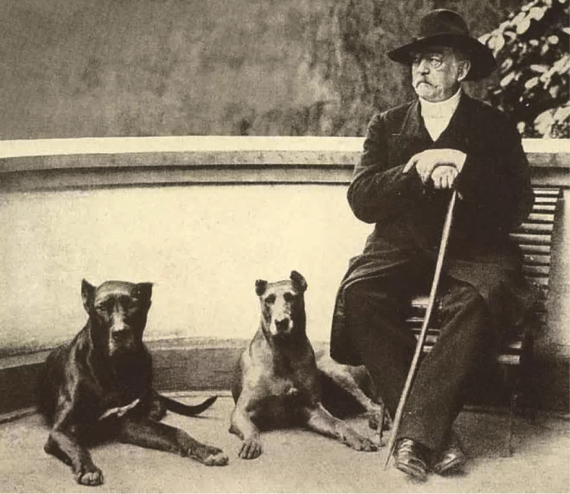Co-authored by Paul Schmelzing
 Photo Credit: Walter Stein
Photo Credit: Walter Stein
"Only a fool learns from his own mistakes. The wise man learns from the mistakes of others." -- Otto von Bismarck
"Study history, study history," espoused Sir Winston Churchill. "In history lies all the secrets of statecraft." At the 200th anniversary of Iron Chancellor and Prussian statesman Otto von Bismarck -- himself an ardent student of history -- the hidden lessons from this remarkable statesman remain ever vital for the future of Europe.
Bismarck, against opposition from his own Junker allies, pursued a revolutionary end to the reactionary and Francophone 'Vienna System', engineered by Metternich and Castlereagh, which depended on a politically fragmented Mitteleuropa. As former secretary of state Henry Kissinger explains, Bismarck changed the map of Europe "with a few brusque strokes [that] swept away the dilemmas that had baffled the German quest for unity." He polarized but nonetheless defined the fate of European history. Indeed, Bismarck's political flexibility has invited a wide array of interpretations on his legacy.
British Liberal politician William Gladstone called him "the incarnation of evil," while Kissinger, in a kinder spirit, called him "Germany's greatest modern figure." But his reputation among contemporaries did not merely arise from his political boldness. In three large, yet often unappreciated ways, his impact was also economic.
First, Bismarck introduced one common currency in 1873 to replace the prevailing eight ones that stood in competition to each other. Second, he championed trade agreements (not least with the archenemy France) against the fierce criticism of the numerous small states and protectionist economists, thus tripling exports between 1860 and 1890. He made Berlin and Frankfurt the continental rivals to the established financial centers in London and Paris. All of which had the positive benefit of unleashing growth in the emergent Reich.
Between his appointment as Prussian prime minister in 1862 and his dismissal as Chancellor by Wilhelm II in 1890, the German economy had doubled in size, cut borrowing costs on its debt by 40 percent, and overtook both France and Austria in per capita income.
Glowingly, even the British Economist noted in 1876 that, "the wonder is, that being what he is in foreign policy, Prince Bismarck should have shown himself so little of a dilettante in finance -- so completely master of the principles of financial policy."
Today, Bismarck's legacy is most keenly felt when Berlin is accused, particularly by Southern Europe, of trying to "Germanize Europe." That criticism -- similar to the rhetoric aimed at Berlin out of Saxony, Württemberg, or Baden before 1870 (all of which eventually benefited disproportionately from unification in capital markets) -- has recently been dismissed by German finance minister Wolfgang Schäuble, when he opined, that "fiscal prudence is not German, it is simply reasonable."
Some of Bismarck's lessons remain hidden in the contemporary public sphere. For example, Bismarck unified the scattered German bond markets, and floated the first Imperial loans in the 1870s. His innovation serves as a striking parallel to today's controversies about 'Eurobonds' -- an idea that is resisted most vehemently in Berlin's Chancellery.
Contrary to Bismarck's militaristic image, he also realized the crucial value of educational spending: state expenditures per high school student more than doubled during his term as Prussian Chancellor.
Similarly, as much as Prussia may have embodied, in the words of Mirabeau, an "army with a state rather than a state with an army", it showed remarkable entrepreneurial vigor. "High politics," Bismarck frequently told his guests at his estate in Schönhausen, "is nothing but business." True to his credo, he and his finance minister Otto von Camphausen realized early the opportunities offered by running efficient public enterprises -- railway companies, utilities, and postal services -- and by issuing state debt to finance their engagement in profitable investment projects.
Against the background of severe speculative crises in the 1870s, Prussia decided to nationalize the railroad companies and run the businesses itself. The cunning soon paid off: by the 1890s, more state revenues were generated by public companies than by either direct or indirect taxes. Bismarck and his advisors realized that it was worth increasing debt levels in the short term -- Prussian debt/national product increased from a mere 14 percent in 1872 to three times this volume in 1892 -- whenever the money could generate higher returns than prevailing interest rates.
In a remarkable show of leadership, Bismarck turned the recurrent crises into an opportunity. He founded the Reichsbank and switched to the international gold standard despite a deep recession, at a time when the troubles of the Berlin stock market had spilled over to the real economy. Incidentally, Deutsche Bank was co-founded in 1870 by Bismarck's advisor Ludwig Bamberger, almost simultaneously with Commerzbank in the same year. Soon, both banks turned into geostrategic instruments as much as commercial ones by financing politically opportune flotations from Russia to the Ottoman Empire.
When Wolfgang Schäuble asks what Europe can learn from Bismarck, the answer that economic history can provide is that Bismarck was economically undogmatic and able to comprehend politics from the viewpoint of the statesman as much as from that of the entrepreneur.
What's more, he realized that political integration could not adopt the pace set by the most reluctant states in the system. Legal and fiscal innovation led to the creation of a "soft budget constraint" for the central Reich, which was suddenly empowered to issue its own debt and finance ambitious infrastructure projects.
Thus, the fact that Brussels' budget merely accounts for 1 percent of EU GDP, appears set to lose the argument over higher infrastructure spending, and remains fully dependent on its member states in comparison looks anachronistic. And finally, Bismarck may take issue with the fact that EU states do not even match the average OECD spending on education. Today, as in the 1870s, the opportunity remains "not to let a good crisis go to waste."
Paul Schmelzing is a current graduate student at Harvard University, specializing in economic history.
